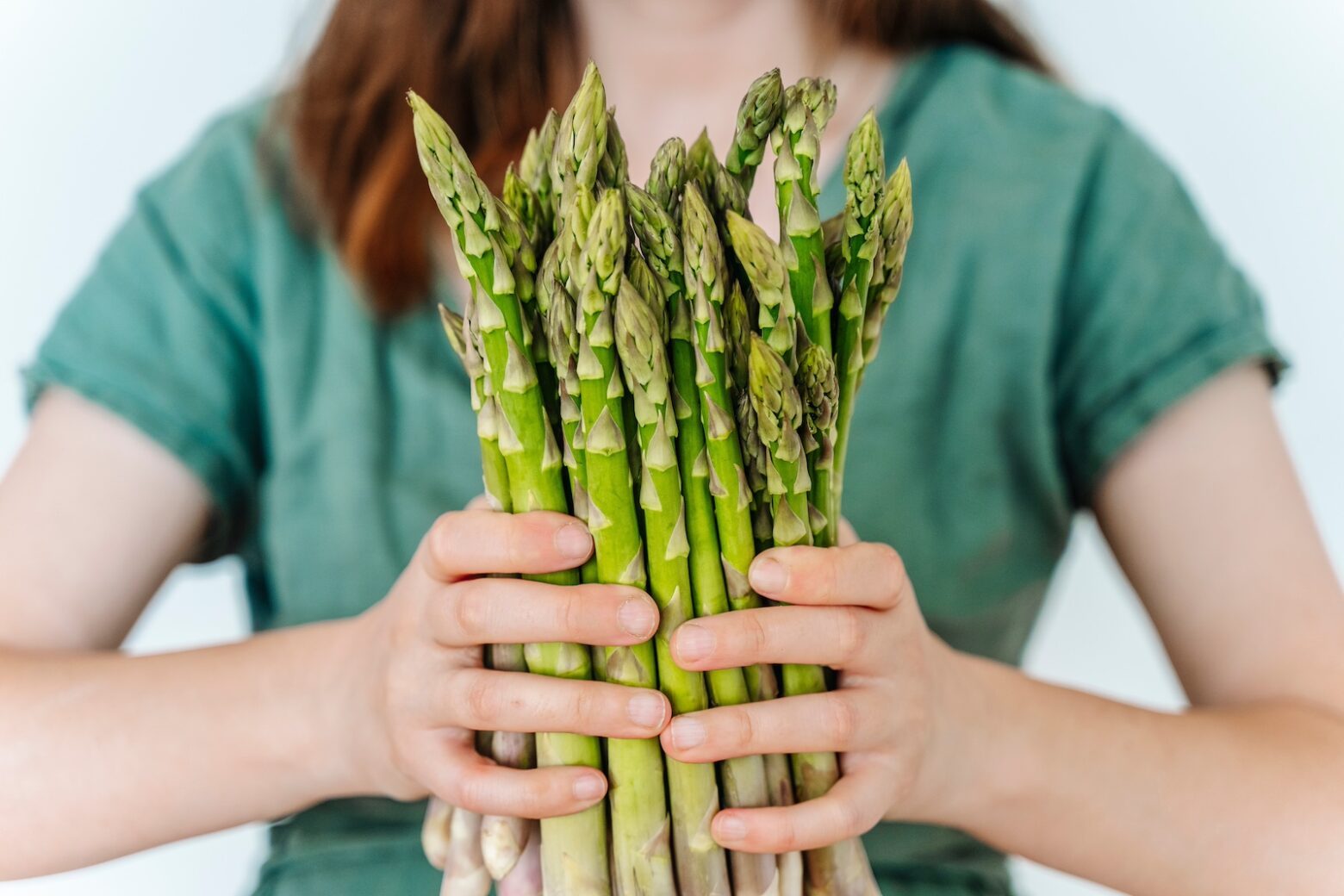Is Asparagus Good for You? Health Benefits of Asparagus for Women

Asparagus is known for its crunchy texture and spear-like shape. Though this green veggie is infamous for its ability to cause urine to have a distinct smell, [1] it also serves as a great side dish or snack and pairs well with savory ingredients like lemon, pepper, and onion powder. However, it’s not just valued for its buttery-sweet flavor. Did you know that asparagus supports women’s health, too?
Why Is Asparagus Healthy?
Asparagus is rich in vitamin A, E, and K; fiber; potassium; and folate [2]. These vitamins, macronutrients, and minerals collectively contribute to making asparagus a powerful, nutrient-dense food choice.
Vitamin A supports eye health, while fiber helps regulate cholesterol levels. Additionally, vitamin E aids in fighting off free radicals in the body and vitamin K promotes beneficial blood clotting. [2] But it’s the high content of folate that makes this particular vegetable a staple for women’s health.
What Is Folate?
Folate, also known as vitamin B9, is crucial for red blood cell formation, healthy cell growth, and optimal cell functionality. [3] Many fruits and vegetables contain this powerful nutrient, such as avocados, beets, broccoli, Brussels sprouts, kale, okra, oranges, melons, spinach, and asparagus.
To obtain folate’s health benefits and support overall body nourishment, the recommended daily intake for adults is 400 mcg. [4,5] Just four spears of asparagus contain 89 mcg of folate, whereas a small orange contains 29 mcg. [6]
The highest concentration of folate can be found in beef liver, with 215 mcg per serving (about 3 ounces). [6] But presumably, you’re not scarfing down 6 ounces of beef liver every day—so it’s important to source folate from a variety of sources, including asparagus.
Folate vs. Folic Acid
It’s a common misconception that folate and folic acid are the same nutrient. In actuality, they are different forms of vitamin B9. [7] Folate is the natural form that occurs organically in foods, while folic acid is a synthetic form of vitamin B9 that is used in supplements and processed foods. [7]
Though folic acid is often touted to expecting mothers for its health benefits, it’s always a better choice to source nutrients from natural, whole foods rather than artificial forms.
How Folate in Asparagus Supports Women’s Health
Folic acid is commonly recommended as a supplement for pregnant women to support proper fetal growth and reduce the risk of birth defects early in pregnancy. [2]
Because foods like asparagus contain high amounts of folate, women may consider skipping store-bought supplements and opt to naturally increase their folate levels through diet. Matthew Casavant, DO, advises 600 mcg of folate daily for pregnant women, saying a “half cup of cooked asparagus provides over 60%” of the recommended daily intake.
Asparagus isn’t just beneficial for pregnant women; it’s also advantageous for women who menstruate. The increased blood loss during menstruation can heighten the risk of anemia. Folate plays a crucial role in building new and healthy red blood cells, making it valuable to include folate-rich foods like asparagus in your diet during and after your menstrual cycle. Even during or after menopause, maintaining a daily intake of around 400 mcg of folate is recommended. [4]
Is There Such a Thing as Too Much Folate?
Yes, too much folic acid from supplements and fortified foods can be problematic, whereas folate from natural foods like asparagus poses no risk of excessive intake.
Let’s dive into a little science to better understand. When consumed naturally from food, folate is converted entirely to the active form of vitamin B9, while not all consumed folic acid is converted right away, which can result in a buildup of unmetabolized folic acid in your bloodstream. [7] Folic acid buildup can have negative health effects, including a risk of cancer. [7] Therefore, when it comes to folic acid, there can indeed be too much of a good thing when it’s artificially derived.
How to Cook Asparagus
When it comes to cooking asparagus, it’s important to avoid overheating to preserve its nutrients. In fact, high temperatures can degrade the nutritional contents of any vegetable or fruit. Dr. Casavant recommends serving meals with warm or chilled asparagus spears that have been lightly steamed. “Steaming helps retain water-soluble vitamins like folate and vitamin C.”
Whether you’re pregnant, menstruating, or simply aiming to nourish your body, asparagus is an excellent choice. It pairs exceptionally well with chicken dishes, salads, citrus sauces, and power bowls.
Try getting creative with your recipes, because you never know what you’ll come up with. For inspiration, The Paleo Diet® offers a variety of delicious asparagus recipes to explore:
Using Whole Foods for Well-Rounded Health
It’s important to note that every woman’s needs vary, whether pregnant, menstruating, or going through menopause. If you’re worried about not consuming enough or consuming too little folate, it’s best to consult with your healthcare provider for a more personalized approach.
The foods we eat can be very influential to our overall health. The Paleo Diet strives to educate people on how to improve lifestyles, health conditions (both mentally and physically), and overall appearance through diet.
Asparagus supports women’s health as an excellent source of nutrients for many who are pregnant and menstruating. But also think about all the other nutrient-dense fruits and vegetables you can use to help improve your overall well-being. You never know how much a simple vegetable can change your health.
References
- Why Does Asparagus Make Your Pee Smell? [Internet]. Healthline. Available from: https://www.healthline.com/nutrition/why-does-asparagus-make-your-pee-smell
- Contributors WE. Asparagus: Health Benefits, Nutrition Facts, and How to Prepare It [Internet]. WebMD. Available from: https://www.webmd.com/diet/health-benefits-asparagus
- Mayo Clinic. Folate (folic acid) [Internet]. Mayo Clinic. 2021. Available from: https://www.mayoclinic.org/drugs-supplements-folate/art-20364625
- Folic acid | Office on Women’s Health [Internet]. www.womenshealth.gov. [cited 2024 Jul 23]. Available from: https://www.womenshealth.gov/a-z-topics/folic-acid
- 18 Foods Filled with Folate Every Woman Should Know [Internet]. www.unitypoint.org. Available from: https://www.unitypoint.org/news-and-articles/18-foods-filled-with-folate-every-woman-should-know
- Office of Dietary Supplements – Folate [Internet]. ods.od.nih.gov. 2022. Available from: https://ods.od.nih.gov/factsheets/Folate-HealthProfessional/
- Arnarson A. Folic Acid vs. Folate — What’s the Difference? [Internet]. Healthline. 2019. Available from: https://www.healthline.com/nutrition/folic-acid-vs-folate
Isabella Mead
Isabella Mead has experience in creating digital content for lifestyle and nutrition brands.
More About The Author




